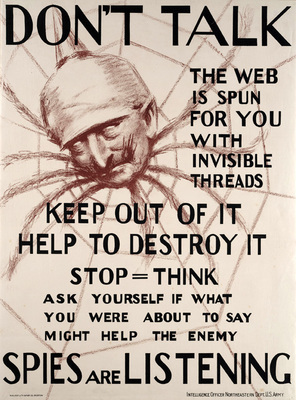
Description
At the outbreak of World War I, German-Americans were the largest immigrant group in the United States, constituting nearly nine percent of the population. Although highly assimilated, ordinary German-Americans became objects of suspicion after America joined the war in April 1917. Government officials demanded that Americans of German descent declare themselves American or traitor. In his Flag Day Speech of 1917, President Woodrow Wilson stated that Germans had filled our unsuspecting communities with vicious spies and conspirators . . . . Fears that German-Americans were aiding and abetting German spies on American soil were wide-spread, although largely unfounded. This poster was designed, printed, and published in Boston by Raymond Crosby, a former student of Charles Woodbury and a prolific illustrator for Life. Printed in one color, it shows the Kaiser as a spider spinning a web of intrigue. Although described in 1918 as warning people against enemy propaganda, the posters message was more sinister, alleging that spies were lurking in every American community. Earlier in the year, the Massachusetts Womens Committee of the Council of National Defense had publicly warned women to avoid war talk in public. Strangers, they reported, . . . have been observed making notes of these conversations. Women were advised to read and destroy all letters from their men in service and to never indulge in telephone conversations. . . . Even wires sometimes leak.
Details
- Work Date:
- 1918
- Credit Line:
- Gift of Bartlett H. Hayes, 1985